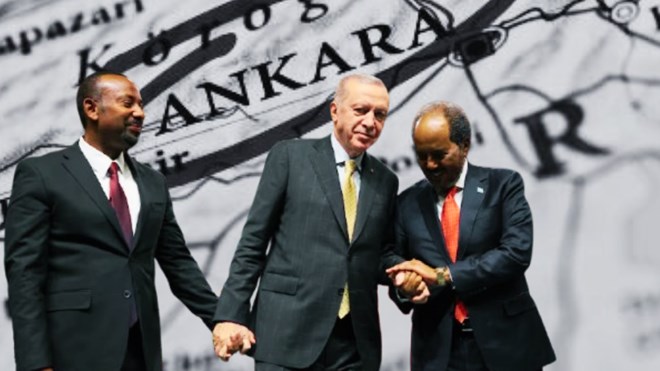Wednesday December 25, 2024
By Aman Obsiye
Can the Ankara Declaration deliver peace, or is Ethiopia playing a game of manipulaton? The recently signed agreement has raised questions about Ethiopia’s interpretation of its commitments, with analysts pointing to its naval ambitions

Türkiye's president, Recep Tayyip Erdoğan, is credited with facilitating the recently signed Ankara Declaration between Somalia and Ethiopia. A memorandum of understanding (MOU) was signed on January 1, 2024, between Ethiopia and the Republic of Somaliland – an unrecognized secessionist region within the Federal Republic of Somalia – igniting an international crisis in the Horn of Africa. The bitter dispute between the neighboring countries raised concerns about a potential regional conflict.
It is unsurprising that Türkiye mediated the Ankara Declaration and serves as its guarantor due to its economic and political interests in the Horn of Africa and the wider Red Sea region. Moreover, Türkiye is staunchly anti-secessionist due to its domestic issues with the Kurdistan Workers' Party (PKK). What the PKK is to Türkiye is what Somaliland is to Somalia.
The Declaration merely articulates the fundamental tenets of the international treaties and laws that regulate international relations. For instance, the Declaration articulates that the "Leaders of Somalia and Ethiopia reaffirmed their respect and commitment to one another's sovereignty, unity, independence and territorial integrity …." These articulations are geared towards Ethiopia more so than Somalia because it is Ethiopia that violated Somalia's sovereignty via its illegal MOU. The MOU stands in opposition to the "principles enshrined in international law, the charter of the United Nations and the Constitutive Act of the African Union."
The real purpose of the Declaration is to avert any potential conflict between the two nations, but tensions may still flare up. According to the Federal Government of Somalia, Ethiopian troops launched an "unprovoked and unexpected" attack on Somali government forces in the town of Doolow (Gedo province). That attack happened on Monday, less than a fortnight after the signing of the Ankara Declaration.
Furthermore, this week's edition of The Economist reported that Ethiopia interprets the Declaration as merely giving it commercial access to Somalia's coast while keeping the MOU intact. Somalia interprets the Declaration as a diplomatic acknowledgement of the MOU's annulment. However, the MOU is not mentioned in the ambiguously worded Declaration, and Ethiopia has not publicly acknowledged that it has canceled the MOU.
Somalia is not the only littoral nation Ethiopia borders; it also borders Djibouti, Eritrea, Kenya, and Sudan. It is no secret that Ethiopia is not simply seeking access to Somalia's coast for commercial access. Its real motive is establishing a navy base and becoming a Red Sea naval power. To accomplish this military mission, Ethiopia needs to have sovereign access to the Red Sea. Hence, its MOU with secessionist Somaliland.
The countries of Ethiopia and Somalia would be perfect commercial partners. Ethiopia has one of the world's fastest-growing economies; it is industrializing and has an export-oriented economic policy. Somalia has Africa's longest coastline, which strategically sits at the nexus of the Indian Ocean, Gulf of Aden, and Red Sea. Both nations could use their comparative advantages to spearhead economic development and enrich their citizens.They can dominate the fast-growing trade between Africa and Asia. For this to happen there must be mutual respect and trust, but Ethiopia continues to prove it’s untrustworthy
The international community must applaud Somalia's president, Hassan Sheikh Mohamud, for his good-faith efforts to negotiate after Ethiopia's brutal attack on his country's sovereignty and territorial integrity. It is Ethiopia's Prime Minister, Abiy Ahmed, who is not conducting himself as a rational international actor. The MOU stands in contrast to the tenets of international law. Additionally, the recent unprovoked attack by Ethiopian troops against Somali soldiers is further evidence of Abiy Ahmed's nefarious agenda against Somalia.
According to the Declaration, both nations are scheduled for technical negotiations in February 2025. Clarification is needed. An explicit renouncement of the MOU must be articulated by Ethiopia at the onset of those negotiations, ideally prior to its commencement. The Federal Government of Somalia has conducted itself according to the norms of international law; it is the Government of Ethiopia that is not negotiating in good faith.
Aman Obsiye is an attorney based in Minneapolis, MN. He received his Juris Doctor and Master of Public Policy degrees from the University of Minnesota.